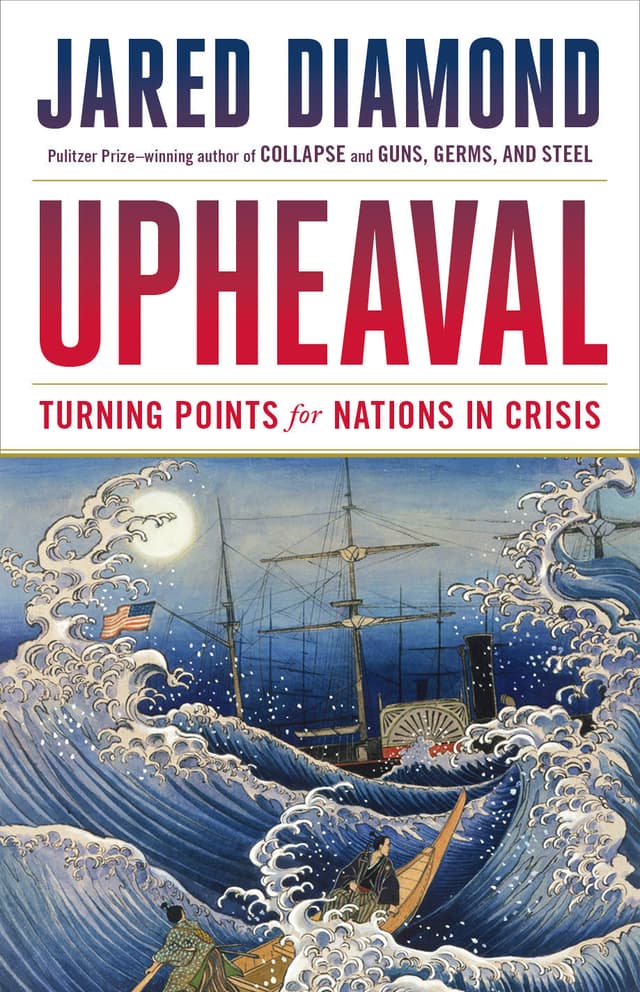
Book Review Summary: Upheaval: Turning Points for Nations in Crisis
Introduction
In his international bestsellers "Guns, Germs, and Steel" and "Collapse," Jared Diamond transformed our understanding of what makes civilizations rise and fall. Now, in his third book in this monumental trilogy, he reveals how successful nations recover from crises while adopting selective changes - a coping mechanism more commonly associated with individuals recovering from personal crises. In "Upheaval: Turning Points for Nations in Crisis," Diamond compares how six countries have survived recent upheavals, from the forced opening of Japan by U.S. Commodore Perry's fleet to the Soviet Union's attack on Finland, to a murderous coup or countercoup in Chile and Indonesia, to the transformations of Germany and Australia after World War Two.
About Jared Diamond
Jared Diamond is an American geographer, historian, ornithologist, and author best known for his popular science books "The Third Chimpanzee," "Guns, Germs, and Steel," "Collapse," "The World Until Yesterday," and "Upheaval." He is Professor of Geography at UCLA and has been elected to the National Academy of Sciences, the American Academy of Arts and Sciences, and the American Philosophical Society. Diamond's extensive research and writing have made him a prominent figure in the fields of geography, history, and anthropology.
Analysis of Views
-
Comparative Analysis: Readers appreciate the comparative analysis of how different nations coped with crises. Diamond's examination of Finland, Japan, Chile, Indonesia, Germany, and Australia provides insights into their unique experiences and the factors that contributed to their resilience.
-
Historical Accuracy: Many readers praise Diamond's historical accuracy in recounting the events and circumstances surrounding these crises. His attention to detail and nuanced understanding of the complexities of each nation's history make the book both informative and engaging.
-
Psychological Dimension: Diamond adds a psychological dimension to his analysis by exploring how both individuals and nations respond to crises. This aspect of the book resonates with readers who appreciate a deeper understanding of human behavior in times of upheaval.
-
Wide-Ranging Coverage: The book covers a broad range of topics, from political crises to social transformations. Readers appreciate the breadth of Diamond's research and his ability to provide comprehensive insights into each nation's journey through crisis.
-
Realistic Breakdowns: Diamond's analysis of each nation's response to crises is praised for its realism. He offers honest assessments of their strengths and weaknesses, providing readers with a balanced view of each country's journey towards recovery.
Reasons for Recommendation
-
In-depth Historical Study: Readers recommend "Upheaval" for its in-depth historical study of six nations facing crises. Diamond's detailed research and comparative analysis provide a comprehensive understanding of each nation's unique experiences and the factors that contributed to their resilience.
-
Psychological Insights: The book's exploration of psychological factors influencing individual and national responses to crises is a significant reason for its recommendation. Diamond's ability to blend historical analysis with psychological insights adds depth to the narrative and provides readers with a more holistic understanding of crisis recovery.
-
Realistic Assessments: Readers appreciate Diamond's realistic breakdowns of each nation's response to crises. His honest appraisals of their strengths and weaknesses offer valuable lessons for both individuals and nations facing similar challenges.
Reasons for Not Recommendation
-
Lack of Quantitative Analysis: Some readers feel that the book lacks quantitative analysis and relies too heavily on anecdotal evidence. While the narrative history is interesting, they argue that it falls short in terms of providing rigorous historical analysis.
-
Bias and Personal Opinion: A few readers criticize Diamond's bias and personal opinions expressed throughout the book. They argue that his political views influence his interpretation of events and detract from the objectivity of his analysis.
Conclusion
"Upheaval: Turning Points for Nations in Crisis" by Jared Diamond offers readers a deep dive into the experiences of six nations facing crises in different historical periods. Through comparative analysis, historical accuracy, psychological insights, and realistic assessments, Diamond provides a comprehensive understanding of how successful nations recover from crises while adopting selective changes. While some readers appreciate the book's in-depth historical study and psychological dimensions, others feel that it lacks quantitative analysis and suffers from bias and personal opinions expressed by the author. Overall, "Upheaval" offers valuable insights into the resilience of nations facing crises and serves as a thought-provoking exploration of human behavior in times of upheaval.